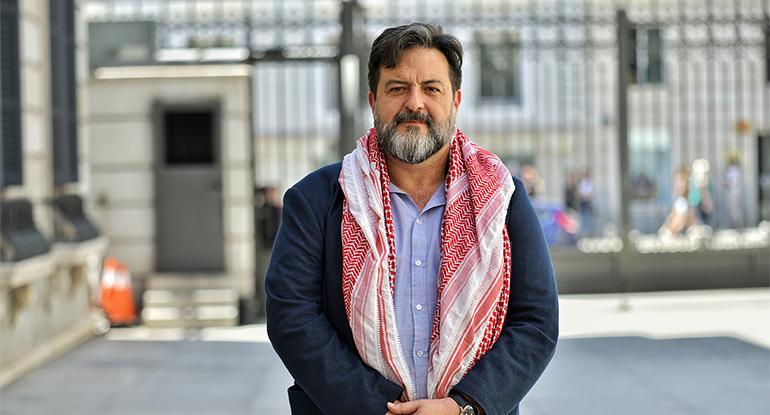The chair of the European Parliament’s Delegation for relations with Palestine, MEP Manu Pineda (The Left, GUE/NGL), had planned to go on an official Parliamentary visit to Palestine next week but has been denied entry by the Israeli authorities.
This is the second time in less than a year, he said at press conference in Brussels on Wednesday. Other members in the Delegation are expected to go ahead with the mission. They are probably not welcome there either by the new Israeli government which has rejected criticism from the US and the EU for escalating the conflict with the Palestinians and finds itself in a constitutional crisis.
It is not clear if the Delegation has planned any meetings with representatives of the Israeli government or opposition.
“It’s unusual, to say the least, that a country that participates in numerous EU programmes and is considered a key partner should prevent our delegation from carrying out its work normally,” Pineda said at the conference. “We believe that the presence of our delegation in Palestine, at a time like this, with the most extremist Israeli government in recent years, is indispensable.”
The Israeli ministry of foreign affairs has issued a statement according to Pineda but did not respond to a request from The Brussels Times for an explanation. Pineda himself links the Israeli reaction to the recent decision by the mayor of Barcelona to suspend the twin-city agreement with Tel Aviv. The mayor of Madrid accused her of antisemitism and offered to replace Barcelona as twin-city.
Pineda has been a member of the European Parliament since 2019 for Izquierda Unida. In June 2021, Euobserver reported that he had been included in a blacklist of eight MEPs who had participated in fake election-observation trips to Russia, Ecuador or Venezuela. The list had been drawn up by the EP at the advice of the Berlin-based European Platform for Democratic Elections.
He has worked in the Gaza Strip and is engaged for the Palestinian rights. As MEP, he has filed parliamentary questions to EU’s foreign policy chief, Josep Borrell, expressing opinions at odds with EU’s position on the Israeli-Palestinian conflict.
In October last year, Pineda and fellow MEPs asked about EU’s position on the Israeli elections where Israeli citizens living in the occupied territories are allowed to vote.
Only on 30 January 2023 did Borrell reply and wrote that the elections on 1 November 2022 was a testament to the vibrant Israeli democracy. He did not comment on the question but repeated that EU’s policy on Israel’s settlement policy remains unchanged and that the EU is committed to a negotiated two-state solution.
In a more controversial question from April last year, Pineda alleged that the Israeli government is imposing apartheid policies on Palestinians both in the occupied territories and inside Israel and asked if the EU will cease cooperating with companies supporting the “apartheid regime”.
This time he had to wait until 13 January 2023 for a reply. The High Representative replied that the “Commission considers that it is not appropriate to use the term apartheid in connection with the State of Israel”.
“The EU will continue to support all efforts aimed at reviving a political process in line with international law, which ensures equal rights and is acceptable to both parties. The EU will engage with both parties and with international and regional partners to this end.”
“The EU is gravely worried by the heightened tensions and increased violence. In the current worrying context, it is important to consider steps to de-escalate the situation and avoid unilateral decisions and actions that would undermine the viability of a negotiated two-state solution to the conflict, and fuel more tensions.
The EU stands ready to help the parties to rebuild a path towards dialogue and work together to reverse the negative cycle of violence and to avoid any further loss of lives.”
In a statement earlier this week, Josep Borrell’s spokesperson said that the EU rejected a decision by the Israeli security cabinet to legalize settler outposts that had been illegal also under Israeli law.
The decision to legalise outposts was pushed through by the ultra-nationalist ministers in the Israeli government in their plan for annexation of the West Bank. The new Israeli government can disregard MEP Manu Pineda but hardly ignore the calls from the EU and the US to de-escalate the situation and avoid unilateral decisions.
The Brussels Times

